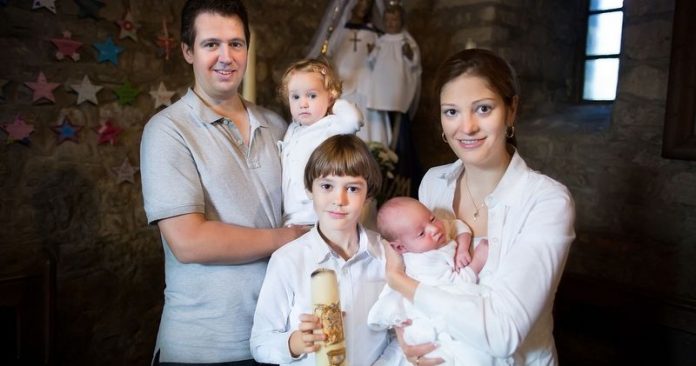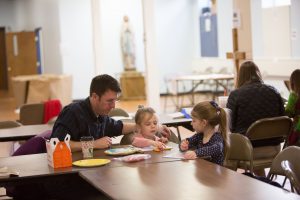
Examining an integrated approach
Bob Alexander
Parent formation is an important component of a good religious education program, yet sometimes it is missing. Integrating the formation of parents into an existing faith formation program can be an effective approach. Well-formed parents are then ready to participate in the growth of their children. As parents and their children learn together, family-centered programming becomes engaging and transformative.
This is exactly why adult catechesis is the highest priority. “Adult faith formation, by which people consciously grow in the life of Christ through experience, reflection, prayer, and study, must be ‘the central task in [this] catechetical enterprise’” (Our Hearts Were Burning Within Us, USCCB, 1999).
Adults as the priority
The National Directory for Catechesis states that a parish catechetical plan “should reflect the priority of adult catechesis” (20).
As a director of religious education (DRE) for six years at a parish in the northwest suburbs of Chicago, I looked forward to accompanying our parents and students during the two-year preparation for the sacraments of Penance and Reconciliation, Eucharist, and Confirmation. The sacramental celebrations at the church and at home involved the entire family: parents, child, siblings, and extended family. It’s critically important that parents are included in both the preparations and the celebrations!
Why is it so important? Let’s look at a sports-related example. Your son or daughter is a member of a team. Suppose that you, as a parent, never attended any meetings, practices, or games during the season. You attended only the final championship game. What message would you be sending? Your child might feel that Mom and Dad don’t really care about them having fun playing the sport, or that the sport is not important. They might conclude that Mom and Dad are just interested in the after-party. Usually, though, one or both parents attend every sports event because it is wonderful to watch their child grow in athletic skills and confidence. Those parents truly desire to be a vital part of their child’s sports journey.
The same concept is true for a child’s faith journey. Parents need to be informed and present. There are several good strategies for family-centered sacramental preparation that involve parents as a vital part of their child’s faith journey.
Develop an integrated approach
It is recommended that the parish personnel, such as the director of adult faith formation, the school principal, and the pastor, meet together to develop an integrated program for parents and children. I’m sharing our sacramental prep program by way of example. In it we encouraged the unity of all parish families, both those within the parish school and those within religious education groups meeting at other times and locations.
The Catholic-school teachers and students followed the same curriculum and used the same texts as the public-school students. The parent meetings, events, and sacramental celebrations were planned for the entire parish — with all families in attendance.
Here are four aspects of the integrated program at our parish, described later in this article:
■ religious education sessions with parents and children
■ teaching Masses and prayer services for parents and children
■ sessions with parents alone
■ home activities for parents and children
We’ve found that an effective sacramental prep program runs for two years: grades one and two for preparation for Penance and Reconciliation and Eucharist, and grades seven and eight (or freshman and sophomore years) for preparation for Confirmation. Based on our experience in the parish, we discovered that children and parents need a minimum of two years to prepare. In cases where a parent first registers their child at the beginning of grade two (or grade eight), we would explain the reasons for the two-year process and plan their sacramental celebrations for grade three (or freshman year in high school).
Promote, promote, promote the program
Parents are extremely busy and often lead stressful lives. Their families are pulled in many different directions: sports, music, dance, homework, after-school activities, weddings and funerals, vacations, medical and dental visits, and so on. Given this reality, the DRE and parish staff must promote the sacramental program.
Our goal is to help parents become knowledgeable about the Catholic faith and effective in the religious formation of their children. Our offerings need to be valued in terms of their time and energy. Plus, it can be fun and interesting for parents and kids alike. Remember that the role of the DRE and catechists is to assist parents in their primary role as educators of their children, including the critical area of sacramental preparation.
Good marketing and communication are essential to the promotion. The objective is that every child in grades one and seven be enrolled. Design a clear and engaging religious ed webpage that contains essential information for parents. Eliminate long and boring explanations — keep it crisp and easy-to-read. Create eye-catching but brief bulletin articles, and snail mail or email letters to parents.
Remind parents of their responsibility to raise their child in the Catholic faith. During the Rite of Baptism, the celebrant declares: “You have asked to have your child baptized. In doing so you are accepting the responsibility of training him (her) in the practice of the faith. It will be your duty to bring him (her) up to keep God’s commandments as Christ taught us, by loving God and our neighbor. Do you clearly understand what you are undertaking?” And, parents respond, “We do” (Rite of Baptism for Children, 1983). Demonstrate how sacramental prep helps parents to be a vital part of their child’s faith journey.
 Sessions for parents and children
Sessions for parents and children
It is very challenging to develop and deliver effective combined sessions for parents and children together. The large differences in age increases the difficulty. However, leaders can emphasize the basics of the faith, clearly explaining the why and how of sacramental preparation.
We chose to not offer combined sessions for the grade-two sacrament prep for Penance and Reconciliation and Eucharist. All sessions were held separately. Only the first Communion practice (in addition to the teaching Masses, prayer services, and home activities described below) was an event for both parents and students.
The grade-eight program for Confirmation consisted of three combined events: 1) the orientation meeting for parents and students, 2) the candidate-sponsor presentation for only sponsors and students, and 3) the Confirmation practice for confirmandi and sponsors (in addition to the teaching Masses, prayer services, and home activities described below). The orientation meeting covered the program overview and the meaning of Confirmation. The candidate-sponsor presentation was a peace-filled evening of faith-sharing between the student and sponsor. The Confirmation practice focused on walking through the special parts of the Mass and the Confirmation Rite.
Teaching Masses and prayer services for parents and children
At many parishes, Mass attendance ranges between 25 percent to 30 percent of the enrolled students. We found this rate to be true for both school families and religious education families. In an effort to help parents and sponsors become more comfortable in the church environment — and to model and encourage Mass participation and family prayer — we scheduled a teaching Mass and five prayer services each year for grades two and eight.
The teaching Mass is a validly celebrated Mass in which the priest pauses at key points to explain what is happening and why. For example, he begins by vesting in front of the sanctuary and describes the meaning of each item that he wears. Parents and students benefit greatly by a deeper understanding of the Mass.
Also, every month or so, a 15-minute prayer service for parents and students was held in the church before the religious education session in the school building. It was wonderful to see many parents praying with their children in church. The children and parents were invited to pray out loud for any intentions. Even though the younger children often prayed for their pet cat or dog, the prayer experiences were very moving.
Sessions for parents alone
At our parish, the faith formation team works together to select relevant topics that parents would find helpful in their everyday family life. Our strategy offers a process of 1) pre-evangelization, 2) evangelization, and then 3) catechesis. We started with a three-year cycle of topics, and then we reevaluated the interests of the participants. These 90-minute parent support sessions are held once a month at the same time and in the same building as the children’s religious education sessions: 9:00 a.m. to 10:30 a.m. on Saturdays for grades K to five, and 7:00 p.m. to 8:30 p.m. on Tuesdays for grades six to eight.
It was invaluable to collaborate with Deacon Keith Strohm and our pastor, Fr. Ed Pelrine, in developing and delivering these sessions. Here is the sequence of topics for years one, two, and three that we co-developed:
YEAR ONE
■ SEPTEMBER: Expectations and Hopes, Positives and Challenges, Life Balance, Personality Assessment
■ OCTOBER: Begin with the End in Mind, Christian Parenting, My Bucket List, My Plan
■ NOVEMBER: (small groups) — What Do We Believe?, What Questions Do We Have?, Sharing Our Faith
■ DECEMBER: God’s Desire for You: Love and Relationship
■ JANUARY: Christ Died for You: Sin and Salvation
■ FEBRUARY: Christ Gives Us His Spirit: Plan, Power, Mission, Presence, Response
■ MARCH: Personal Witness
YEAR TWO
■ SEPTEMBER: Where Am I Now?: Expectations, Gifts and Talents, Challenges and Struggles
■ OCTOBER: Identity: Who Am I?, Purpose: Why Am I Here?, Destiny: Where Am I Going?, The Mystery of Suffering
■ NOVEMBER: Bible Basics, Part 1
■ DECEMBER: Bible Basics, Part 2
■ JANUARY: The Six Disciplines of a Disciple
■ FEBRUARY: The Seven Sacraments
■ MARCH: The Eucharist
YEAR THREE
■ SEPTEMBER: Managing Stress
■ OCTOBER: Parenting in a Crazy World
■ NOVEMBER: Why Should Jesus Matter?, Part 1
■ DECEMBER: Why Should Jesus Matter?, Part 2
■ JANUARY: Christian Prayer
■ FEBRUARY: The Six Disciplines of a Disciple
■ MARCH: The Four Last Things: Death, Judgment, Heaven, Hell
In addition, the following parent-only or sponsor-only sessions were important components of the sacramental prep program for students in grade two and grade eight:
■ SEPTEMBER: Orientation meeting for grade two parents: program overview and meaning of Penance and Reconciliation and Eucharist
■ NOVEMBER: Sponsor formation event for grade eight sponsors: how to be a great sponsor
■ JANUARY: First Penance and Reconciliation preparation for grade two parents: basic theology and praxis/ritual
■ FEBRUARY: First Communion preparation for grade two parents: basic theology and praxis/ritual
Home activities for parents and children
The publisher that we selected for the student workbooks also offered take-home booklets for families. These booklets prescribed interesting family activities to prepare for receiving each sacrament: Penance and Reconciliation, Eucharist, and Confirmation. We also purchased two specific guides: one for parents and one for sponsors of Confirmation candidates. Each week the in-home activities correlated to and reinforced the topics in each in-class lesson.
There are many good strategies for family-centered sacramental preparation. A few are suggested in this article. They may not all work with your families and in your parish. Select the ones that are effective within your own parish culture. Ask the Holy Spirit to guide your decisions and actions to integrate parent formation in your local programming. May the Lord bless everything you do to make disciples of Jesus Christ!
Bob Alexander, MA, MS, is an Associate Director in the Archdiocese of Chicago’s University of Saint Mary of the Lake (see InstituteForLayFormation.org). Previously, he served as the director of religious education at a parish in the northwest suburbs of Chicago.
This article was originally published in Catechist magazine, March 2019
PHOTO: GEORGE MARTELL/BAYARD INC.




